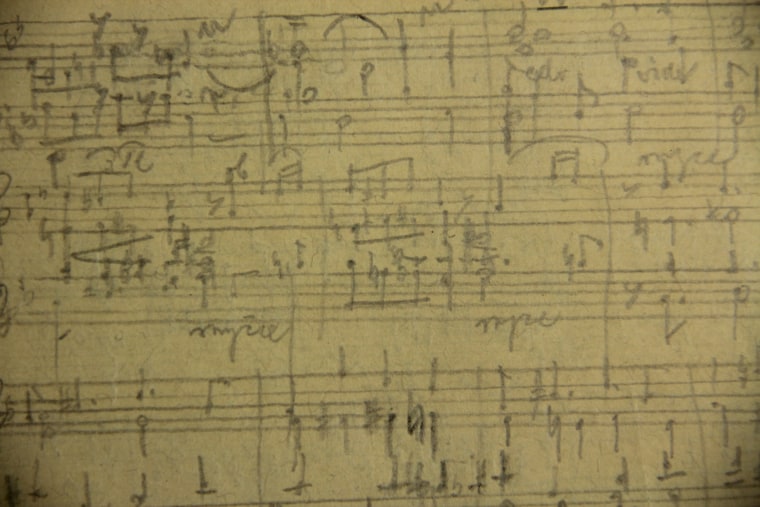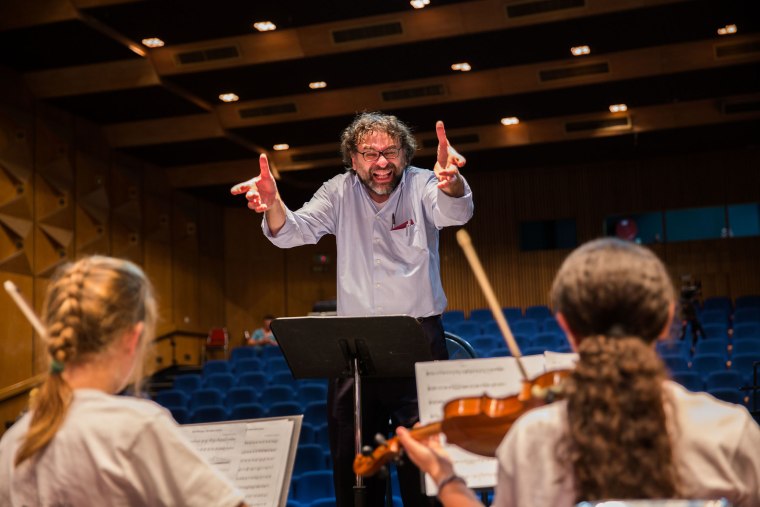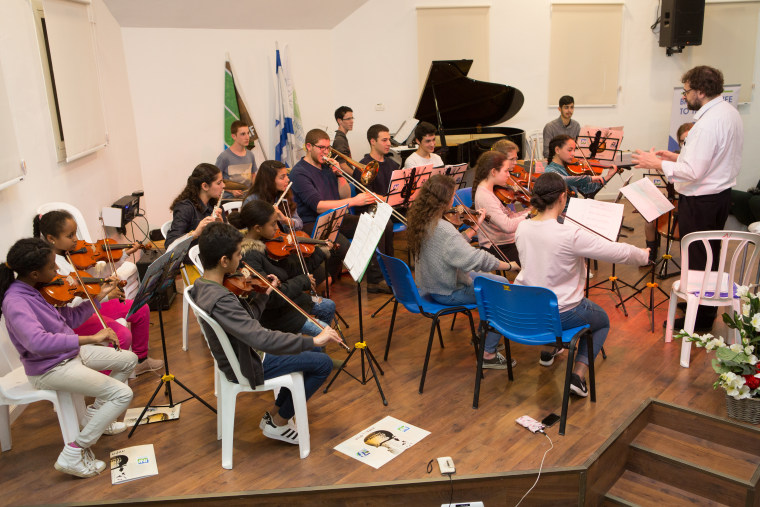ASHDOD, Israel — Tzur Shoham’s fingers dance across the piano keys as a trumpet’s high notes thread the melody. A light drumbeat rat-tat-tats.
The tune is upbeat but its story devastating: The teen and his companions are playing one of 8,000 salvaged works composed during the Holocaust. That playful pieces emerged from such devastation is not lost on Shoham.
“The music is beautiful and surprisingly happy,” says the student from Yerucham in southern Israel. The composers “were in a terrible situation and managed to do such beautiful music, and I think it is amazing.”
The 16-year-old is one of 20 students who on Sunday will join Israel’s Ashdod Symphony Orchestra to play works composed during the Nazis’ reign of terror during World War II.
The Jerusalem concert will celebrate the 70th anniversary of the founding of the State of Israel, and also falls on the 73rd anniversary of the liberation of Germany’s Bergen-Belsen concentration camp.
Shoham feels personally connected to this work as his grandfather survived the Holocaust.
“He heard this music and was very excited about it,” Shoham says.
For Italian composer Francesco Lotoro, the concert is a culmination of decades of work.
He has traveled the world to salvage pieces ranging from one sheet of violin music to operas, puppet theater tunes and pieces written for plays.
Songs will be presented in Yiddish, Hebrew, Romani and German, and at least one composition was found on concentration camp toilet paper.

One of the pieces will get a different treatment.
Illustrating the enduring ties between the Nazis’ victims and those alive today, Aviva Bar-On will sing a piece she learned by heart in Theresienstadt concentration camp in German-occupied Czechoslovakia.
Famous Jewish musician Ilse Weber taught the melody to the camp’s children while she worked there as a nurse. When Weber’s husband Willi was deported to Auschwitz, Weber asked to be transferred too, along with the couple’s son. Mother and child were sent to the gas chamber upon arrival. Willi Weber survived.
While the song was never written down, Bar-On will perform it from memory more than 70 years after learning it.

“I’m searching all my life for music written by Jews in all concentration camps,” Lotoro said. “Music written by all people and social groups — Jews, Christians and some Muslims. All people, including communists, homosexuals, all people that were prosecuted and exterminated or survived.”
The concert featuring pieces composed by inmates of camps such as Auschwitz, Theresienstadt and Westerbork is also aimed at raising awareness of rising anti-Semitism, according to the Jewish National Fund U.K., a charity organizing the concert.
“This is a story of the defiance of the Jewish people and their ability to survive even in the most difficult times to continue and survive," says Samuel Hayek, the group's chairman. "Life did not end with the murder of these musicians. Life remains with the music they have written."
While some six million Jews are believed to have died in the Holocaust — some two-thirds of Europe’s Jewish population — millions of Marxists, homosexuals, Roma, political dissidents and others were also victims of the Nazis and their collaborators.
Musicians had little choice but try and create something lovely in the face of such vast loss and injustice, Lotoro says.
“What can you do?” he says. “Either you do a rebellion, which will surely end in tragedy, or you sing. So a lot of them used to sing.”
Lotoro added: “People can be persecuted and discriminated [against], but you can’t stop them from doing music.”
Alexandra Yatzik is one of the students from two music schools in southern Israel chosen to participate in the concert.
“I know that these are works written in the Holocaust in concentration camps, under harsh conditions, charcoal and toilet paper,” the 12-year-old violinist says. “When I learned to play one of the pieces, I tried to think about what they were going through when they wrote the piece and convey their emotion.”
Paul Goldman reported from Ashdod, and F. Brinley Bruton reported from London.
CORRECTION (April 13, 2018, 6:55 a.m. ET): An earlier version of this article misstated the role the Jewish National Fund U.K. played in the concert. The charity organized the event, it did not sponsor it.


